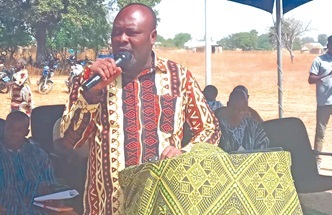
Collective efforts needed to build climate resilient communities — USAID Project
The United States Agency for International Development (USAID)-funded Feed the Future Policy LINK project has called for collective actions from all stakeholders to deal with issues of climate change in communities.
It was thus important to build the capacity of actors, particularly at the local community level, to be able to cope with, and adapt to the devastating impact of climate change on their lives and activities.
The Upper East Regional Manager of the project, Eric Maasole, who stated this, said no one group could deal with the issue as the dynamics were interwoven, and like a chain, would require each one to play his role to achieve the desired impact.
He was speaking at a community sensitisation durbar on climate change in Tilli in the Bawku West District last Tuesday.
Durbar
The event, organised by the Feed the Future Ghana Policy LINK , was on the theme: “Mobilising communities for climate action: Building resilience together”.
Mr Maasole said the durbar formed part of a series of initiatives to promote behavioural change at the local level by enhancing the ability of community members to be able to deal with and adjust to the impact of climate change on their livelihoods and food security.
Shared vision
The Feed the Future Policy LINK project manager stated that the move was a step towards building community resilience, fostering sustainable agricultural practices and creating a shared vision for a climate resilient future for the benefit of all.
![]()
The community durbar
He added that in dealing with impact of climate change, there was the need for community members to adopt practices that would protect the environment, namely forest conservation, sustainable agricultural practices and water resource management, among others.
Assessment
The Climate Change Lead, Feed the Future Policy LINK Activity, Dr Gerald Forkuor, said the activity started with no pre-defined activities as they wanted to hear from the stakeholders what were the real issues concerning climate change.
He indicated that at the end of the assessment it came to light that there was limited knowledge and awareness on climate change, saying “peoples knowledge of their contributions to reduce the impact of climate change on themselves were inadequate”.
He added that as a result, subsequent activities were driven by the results of the assessment that was done.
He stressed that people at the local level who bore the brunt needed to be aware of sustainable practices they should adopt to reduce the impact of climate change on them.
Efforts
The Bawku West District Chief Executive, Tahiru Issahaku Ahmed, entreated chiefs, opinion leaders the media and other relevant stakeholders to make strenuous efforts to tackle activities contributing to climate change.
That, he said, could be done by helping to create awareness and ensure greater commitment to environmental conservation and climate change adaptation policy in the district and the region.
Writer’s email; gilbert.agbey@graphic.com.gh

 Click the link to read your copy.
Click the link to read your copy.